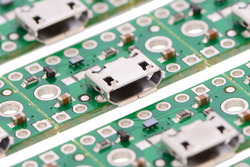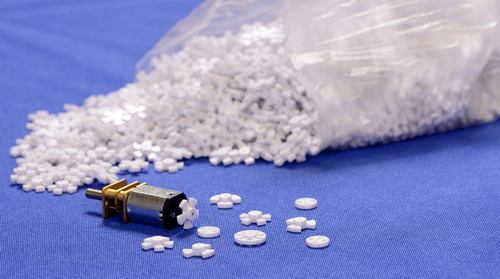Pololu Blog »
Posts tagged “product development”
You are currently viewing a selection of posts from the Pololu Blog. You can also view all the posts.
Popular tags: community projects new products raspberry pi arduino more…
USB connectors: Mini or Micro?
When we designed the first version of the Pololu USB-to-serial adapter way back in 2004, using a USB Mini-B receptacle was an obvious choice: it was much smaller than the standard B-type connector, allowing us to keep the board compact, and it was readily available in surface-mount configurations that facilitate automated printed circuit board assembly.
We went on to use the Mini-B connector in lots of products, like our Maestro servo controllers and Wixel. Although the even smaller Micro-B connector became part of the USB specification in 2007, it didn’t seem to offer enough of an advantage over the Mini-B connector for us to immediately switch over. Continued…
New product: FPF1320 Power Multiplexer Carrier with USB Micro-B Connector
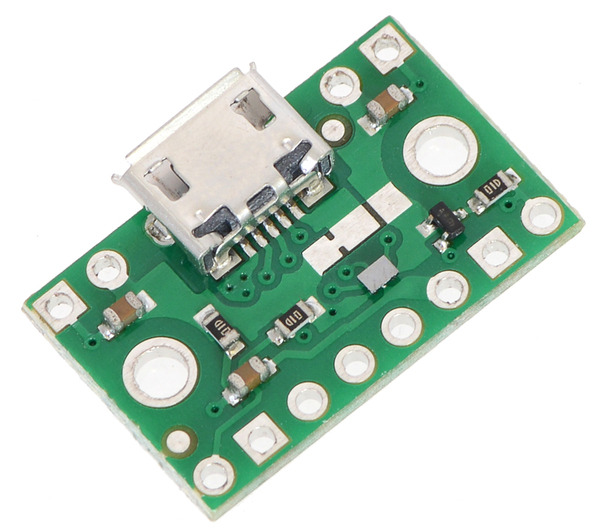 |
Here at Pololu we love USB and put a USB port on most of the microcontroller boards that we make. One of the lovable things about USB is that it provides a convenient power supply, but making good use of USB power presents a board design challenge: many of our products can be powered from either USB or an external source (e.g. batteries) and require a circuit to select between the two power sources. We call this circuit a power multiplexer, or just power mux.
A simple power mux like the one we use on the Wixel consists of a pair of diodes with a MOSFET that automatically disconnects the less-preferred power source. You can see another instance of the diode mux in the Orangutan SVP schematics (99k pdf). This works, but the forward voltage drop of the diodes can cause the output of the mux to be too low to power 5 V devices.
In the maker community, 5 V is very popular since it is the voltage standard used by numerous devices from Arduinos to Sharp Distance Sensors. Unfortunately for us, 5 V is not important for modern consumer devices like mobile phones, which operate at much lower voltages, so there is not much reason for semiconductor manufacturers to build the kind of devices that we need for good 5 V power multiplexers.
The USB power mux on many Arduinos uses a MOSFET, and does not suffer from the forward voltage drop problem, but it allows current to flow into the USB port in some situations, a potentially dangerous violation of the USB specifications.
So we were excited to find the FPF1320, a chip from Fairchild that implements a better MOSFET-based power mux circuit. The FPF1320 switches up to 1.5 A of current at 1.5 V to 5.5 V with an insignificant voltage drop, and it blocks reverse current into either of the sources. This chip seems like a great solution for USB power and other power-switching situations. Its tiny size, however, makes it inaccessible to most hobbyists:
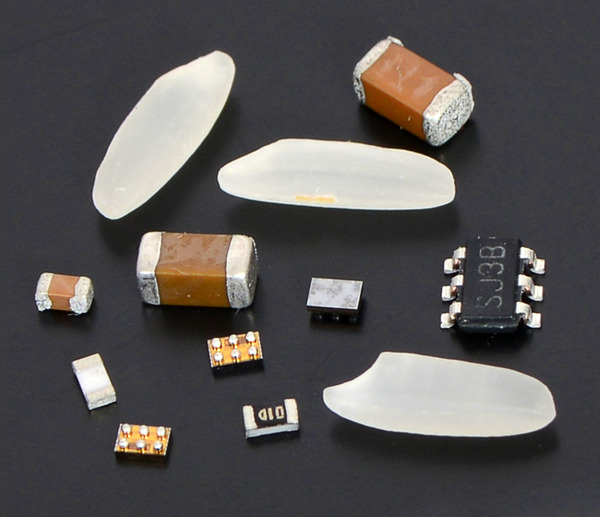 |
Three FPF1320 BGA parts (two with solder balls facing up) among grains of rice and components in 0603, 1206, and SOT-23 packages. |
|---|
That’s where we come in! We have made the FPF1320 available on a carrier board that breaks out all of its lines onto breadboard compatible pins and implements a minimal circuit to support automatic power switching. Our carrier board also breaks out a USB Micro-B connector to support USB power-switching applications. This diagram shows how the carrier would be used in a typical USB application:
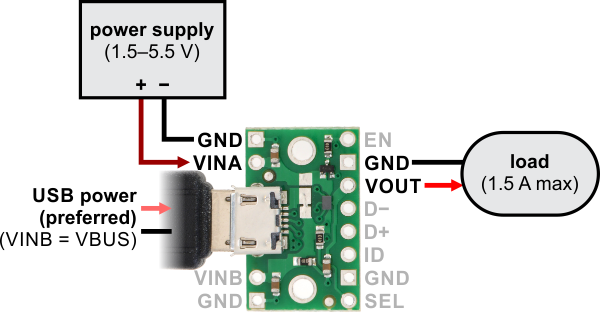 |
Typical connection diagram for using the FPF1320 power multiplexer carrier with USB as the preferred supply. |
|---|
Power multiplexers are useful for more than just USB. For example, many devices can be powered by both batteries and an external power jack, with external power preferred when it is available. Our FPF1320 carrier can be connected to two non-USB power supplies:
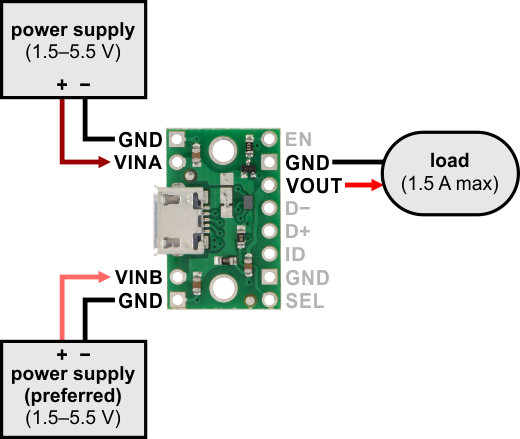 |
Typical connection diagram for using the FPF1320 power multiplexer carrier without USB. |
|---|
Building a good power mux is a challenge, and the FPF1320 is not a perfect solution. One frustrating thing about it is that it is disabled (powered off) by default, and enabling it required us to build an additional power mux into the circuit! As you can see in the schematic below, we used the double-diode technique to drive the EN line high:
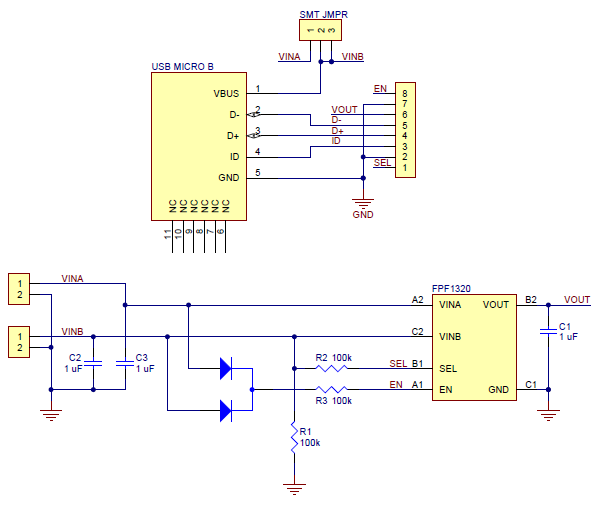 |
The diodes, unfortunately, take up more board space than the FPF1320 itself.
While typical applications involve USB and 5 V, our carrier is designed to work over the full range of input voltages supported by the FPF1320; therefore, extra consideration might be required to ensure glitch-free transitions between power sources. Specifically, we designed it to “prefer” one of the power supplies whenever it is present. The board will allow the preferred supply (and hence the output) to drop to 1.5 V or lower before switching, even if a better alternate source is available. Unfortunately, this guarantees that the voltage will always drop to below 1.5 V when switching from the preferred to the alternate source. The chip is capable of a seamless transition, and a more sophisticated application might involve monitoring the levels of both input voltages and switching in an intelligent way. You can also adjust the behavior to match typical applications using a few additional resistors or other components. Our carrier brings out the SEL line to make these kinds of modifications possible in your application.
For more information, see the FPF1320 Power Multiplexer Carrier product page.
